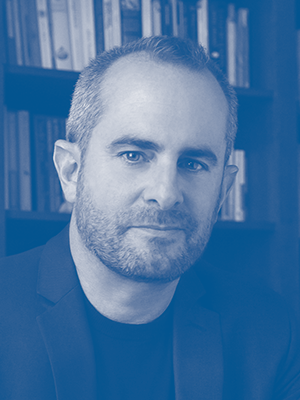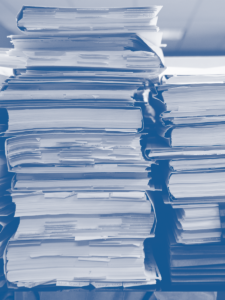As we approach the one year anniversary of October 7, we asked a few of our colleagues and associates from across the Jewish communal, professional, and intellectual worlds to share a printed source or text they’ve turned to or are thinking about to grapple with the American and global Jewish life in the wake of the tragedy in October 2023, and the ongoing war in its wake? Here are the responses.
Sara Allen, Executive Director, BeWell and Associate Vice President, Community & Jewish Life / JFNA
Uninvited thoughts and images flash through my mind. Just as quickly, words follow: do not be daunted.

Late summer in California is full of long, sunny evenings. I stand in the park, kicking a soccer ball to a 9 year old in his favorite Messi jersey. Sometimes I am in the backyard, tossing a worn football to his older brother. Occasionally, I needle the teenager to leave his video game and join us outside.
I look at my boys. In another life they would have been soldiers. In this one, the war feels distant to them. When they come, I answer their questions neutrally, factually. I pepper in stories to give just a glimpse into the changed world they will inherit. Most days there are no questions, and I am equally sad and relieved.
The boys never want to come inside. Another pass, another throw. In another life they might have been hostages.
Do not be daunted by the enormity of the world’s grief. It seems too much to ask. If only the world were grieving with us. Am I allowed to be daunted by the enormity of the world’s injustice?
I repeat the phrase to myself until it twists and morphs. Do not be daunted. Do NOT be daunted. You are not daunted. The grief is enormous, but you will not be daunted.
Generations have recited these words for more than 2,000 years. What apocalyptic horrors did they grieve? Whose words are these, I wonder? The passage has a mixed provenance, attributed to the Talmud and sources interpreting the prophet Micah, and Pirkei Avot. They follow equally forceful lines: ‘Discipline yourself to attention; / for the alternative is despair.’
The alternative is impossible. In despair we are still, and silent, and alone. ‘Do justly, now. Love mercy, now. Walk humbly, now.’ Act, we are commanded, act now now now. Hope lives in action. Every act—of advocacy, of fundraising, of truth telling, of comforting and remembering —connects us to community and creates a different future.
I toss the ball and think: my boys owe their Jewish lives to this commitment to action. Maybe while shaken, or fearful, or outraged. But never daunted.
Sara Allen draws on more than two decades in public relations representing cutting-edge global brands such as Skype, Viber and Nintendo, as well as a decade in the Jewish innovation space. Recognized as an impassioned advocate and driving force behind identifying and implementing breakthrough strategies, Sara serves as the Founding Executive Director of BeWell, JFNA’s mental health initiative.
Laura Herman, Director of Program and Evaluation, JPRO
Shortly after October 7, my supervisor, JPro’s Chief Strategy Officer, Deirdre Munley, invited me to read “Lessons in Leadership: A Weekly Reading of the Jewish Bible” by Rabbi Lord Jonathan Sacks, z”l, weekly with her in chavruta, paired learning. What has struck me most about our experience reading this book, aside from deepening our professional relationship, is the way it seems that each essay speaks directly to the challenges facing Jewish communities today.

Two weeks ago, for example, in Rabbi Sacks’ essay on the weekly Torah portion, Ki Tavo, in the book of Deuteronomy, he wrote about how Moses transformed the Jewish people into a nation of storytellers, connecting us to our past while giving us an opportunity to envision the future. This thought sparked a conversation about how Deirdre and I relate to the story of the nation of Israel and the role Israel plays in modern Jewish peoplehood. Our discussion provided a forum for us to articulate how we understand, both intellectually and emotionally, the experience of Jewish communities over the last year.
The grounding of an outside text has enabled me to contextualize and give voice to my thinking about the deep impact of what has transpired since October 7. Some weeks Rabbi Sacks’ words challenge me to think differently, and other times they validate existing feelings. In the months since starting this practice, reading Rabbi Sacks’ book in chavruta has become a sacred ritual that provides a regular cadence for me to process the current challenges we face. As we approach the yarzheit, anniversary, of October 7, it is comforting to know that I can draw on this text each week.
Laura Herman (she/her), EdD, brings over a decade of experience to her work as JPro’s Director, Program and Evaluation. She is an alumna of the Pardes Institute for Jewish Studies and a Wexner Field Fellow. Laura has a doctorate in Jewish Education from the William Davidson School at the Jewish Theological Seminary. She is passionate about survey writing, critical thinking, and challah making.
Samira Mehta, Professor, Women’s and Gender Studies and Jewish Studies at the University of Colorado Boulder
You have asked me to reflect on “is there a printed source or text you’ve turned to or are thinking about to grapple with the American and global Jewish life in the wake of the tragedy in October 2023, and the ongoing war in its wake?” Rather than thinking about a specific source, I have found myself thinking about a dilemma in Israel’s relationship to the diaspora, the question, specifically of “Who is a Jew?”
Perhaps the most canonical moment of this controversy erupted on July 20, 1958, when the Israeli government allowed people to be counted as Jews if they self-defined as such, regardless of whether they were Jewish according to Jewish law. This decision created controversy between the Israeli ruling party and their Orthodox coalition partners and resulted in Ben Gurion writing to an international collection of Jewish intellectuals to ask how to define “who is a Jew.” The letter Ben Gurion wrote, asking major Jewish thinkers to weigh in on “who is a Jew,” symbolizes the wide gulf that would ultimately open up between the Israeli State and the Jewish diaspora.

I chose a text from over fifty years ago, but I am a scholar of relatively contemporary American Jewish history. In particular as someone who wrote a book on trends in interfaith marriage, I tend to think of this dilemma in terms of moments like the Reform movement’s “patrilineal descent” decision in the early 1980s. That decision considered a child Jewish if they have one Jewish parent and a Jewish education. The Reform movement’s decision represented a break between the largest Jewish movement in the United States and the state of Israel, over the question of who counted as a Jew. Because the Reform movement had a more capacious definition than the Israeli state, and because Zionism in the form of love for the current state of Israel was baked into Reform religious education, the Reform movement’s decision created at least a generation of people who believed that they were Jews and Israel was built for them, and who found out, often traumatically, in moments like their birthright trip, that the Israel that they had been raised to love did not see them as Jews. They have the right of return, which only applies to Jews, but because that right is limited to people with one or more Jewish grandparent, unless they marry someone with more direct Jewish status, they cannot pass that right on to their grandchildren. For many people that I interviewed for my book, this meant that Israel did not see them fully as Jews.
As a result, in moments like this, when many corners of the Jewish establishment demand that all of Jewry stand united with Israel, I wonder what it means to ask Jewish people to stand with an Israel that refuses to acknowledge them as Jews.
Samira K. Mehta is an Associate Professor of Women’s and Gender Studies and Jewish Studies at the University of Colorado Boulder. She is the author of the National Jewish Book Award Finalist Beyond Chrismukkah: The Christian-Jewish Interfaith Family in the United States and The Racism of People Who Love You: Essays on Mixed Race Belonging, which Oprah Daily called “the epitome of a book meeting a moment.”
Rabbi Dr. Jay Michaelson
The days after October 7, 2023, were a collective grief experience. There was shock, disorientation, sadness, and rage, all cycling through minute to minute, even moment to moment. Everything felt overwhelming.
And yet, before any of the dead were even buried, a lot of people were offering opinions. Who is to blame, what is to be done—even, in some circles, who were the victims and who the perpetrators. Pundits, politicians, and partisans acted as though our collective grief didn’t exist, as if we weren’t all reeling, too shocked to process anything at all.

A text that helped me during that period was Pirkei Avot 4:18, in which Rabbi Shimon ben Elazar teaches, “Do not appease your friend at the time of his anger, and do not comfort him while his dead still lies before him.”
Grief, loss, and anger need space and time to unfold—even well-intentioned words can unintentionally cause harm. And in the days after the attacks, it was too soon for words of comfort—let alone punditry. I remember wishing everyone would just shut up.
Rabbi Shimon’s wisdom is familiar to Jews who observe the practice of shiva, the seven days of mourning after the loss of a loved one. During this time, the person in mourning does nothing. They don’t “move on.” They may not even seek comfort. The invitation is to just sit there with the grief, confusion, shock, and loss, so that, in time, the soul can heal.
Of course, healing doesn’t happen in a week—or twelve months. Over the last year, we’ve seen immense pain, even trauma, in the Jewish community. And tragically, we’ve seen how that pain can be manipulated. Cynical politicians have exploited our pain for their own ideological purposes. Our own leaders have often fanned our fears instead of addressing them with wisdom. And many extremist activists on left and right actively provoke them, harming not just Jews but their own causes as well.
Maybe, then, we should supplement Rabbi Shimon’s advice with this: While we can’t control what others say or do, we can at least be aware of our own hearts and minds. And when I look inside and around me, it’s clear that we are still raw, still vulnerable—and of course, the horrors continue for both Israelis and Palestinians.
In many ways, our dead still lie before us.
Rabbi Dr. Jay Michaelson is the author of ten books, a journalist (Forward, CNN, Rolling Stone), and a field scholar at the Emory Center for Psychedelics and Spirituality. His newest book, a collection of kabbalistic short stories entitled The Secret that is not a Secret, was published last year by Ayin Press.
Amanda Pogany, Head of School, Luria Academy of Brooklyn
אֲנִי וְאַתָּה נְשַׁנֶּה אֶת הָעוֹלָם
אֲנִי וְאַתָּה אָז יָבוּאוֹ כְּבָר כּוּלָם
אָמְרוּ אֶת זֶה קֹדֶם לְפָנַי
זֶה לֹא מְשַׁנֶּה
אֲנִי וְאַתָּה נְשַׁנֶּה אֶת הָעוֹלָם
אֲנִי וְאַתָּה נְנַסֶּה מֵהַתְחָלָה
יִהְיֶה לָנוּ רַע, אֵין דָבָר זֶה לֹא נוֹרָא
אָמְרוּ אֶת זֶה קֹדֶם לְפָנַי
זֶה לֹא מְשַׁנֶּה
אֲנִי וְאַתָּה נְשַׁנֶּה אֶת הָעוֹלָם
You and I we’ll change the world
you and I by then all will follow
Others have said it before me but
doesn’t matter you and I we’ll change the world.
You and I we’ll try from the beginning
it will be tough for us, no matter, it’s not too bad!
Others have said it before me but it
doesn’t matter you and I we’ll change the world.

Since October 7th, the playlist running through my head has primarily been made up of prayers. Prayers for the return of the hostages. Prayers crying out to God from the depths of my sorrow, asking for some way forward. Prayers to give me the strength I need to hold my community through what seems like an endless nightmare. I never imagined that a year later, the playlist would still be on repeat. There have been many moments when I’ve wanted to give up, when it felt too sad to hope, too painful to dream of a better tomorrow.
But somehow the song that I keep coming back to in Ani V’ata by Arik Einstein.
אֲנִי וְאַתָּה נְשַׁנֶּה אֶת הָעוֹלָם, You and I, we’ll change the world. It’s the only song on the playlist that gets me up in the morning. This song, that’s more than 50 years old, a song that has brought hope to Israeli’s war after war, conflict after conflict. It feels like the only answer, the only path forward.
אֲנִי וְאַתָּה נְנַסֶּה מֵהַתְחָלָה, You and I, we’ll try from the beginning. Let’s start again. Let’s open ourselves up to new possibilities. Let’s figure out how to listen to each other. Let’s find a new path forward. Let’s get this playlist off repeat.
Amanda Pogany is in her thirteenth year as the Head of School at Luria Academy of Brooklyn. Amanda is a graduate of the Pardes Educators Program, has a Masters in Jewish Education from Hebrew University and a BA from Barnard College. She is an alumna of the Wexner Field Fellowship and is a recipient of the 2020 Covenant Award. She is a Jewish education consultant to Sesame Street and a co-founder of Altshul, an independent egalitarian minyan in Brooklyn.

